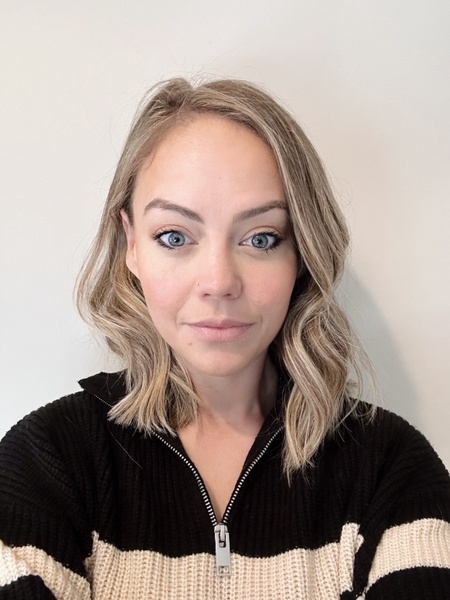Cara joins the group from Northern Ireland, where she is currently finalising her health psychology PhD in the Centre for Improving Health-Related Quality of Life (CIHRQoL) at Queen's University, Belfast.
She has inter-disciplinary research interests in psycho-oncology and public health and is particularly interested in the process of adjustment to chronic illness and the psychology of pain.
Tell us a bit about yourself.
I graduated with a BSc in Criminology and Criminal Justice in 2012, where my dissertation focused on societal perceptions of female offenders. Whilst I enjoyed my undergraduate degree, I quickly swapped prisons for healthcare, and spent several years working in third sector cancer support services, prompted by my lived experiences of caring for my mum who had terminal oesophageal cancer. In 2019, I returned to academia to undertake a PhD in Health Psychology. My PhD research looks at improving Health-Related Quality of Life outcomes for advanced oesophago-gastric cancer patients, using mixed methods approaches.
I particularly enjoy adopting a combined public health psychology approach to research. I’m a keen advocate for research that is translatable into policy, and recently enjoyed worked as part of a steering group to develop the NI Cancer Strategy 2022-2032. Patient and Public Involvement (PPI) is another core interest of mine, and involving those with lived experience is often at the heart of my research.
What will you be investigating while you are in Aberdeen?
I have joined Aberdeen to work on the Consortium to Research Individual Interpersonal and Social Influences in Pain (CRIISP) and Making it Work™ - Scotland. CRIISP is a project seeking to understand how people living with chronic pain experience everyday life and how societal aspects of our lives impact on the pain experience, and vice versa. Making it Work™ - Scotland is a project looking at how we can support people with musculoskeletal disorders in Scotland to remain in work. The primary focus of this project is to adapt the Making it Work™ intervention developed for people with inflammatory arthritis in Canada to a broader range of MSK conditions and a Scottish / UK health and social care context. Both involve working with public contributors throughout.
Why did you choose Aberdeen?
I attended a training course in Aberdeen in 2020 and had a really great experience – it was all about the people for me! I returned to Northern Ireland, telling my husband that one day I would like to live in Aberdeen. Fast forward 3 years and I saw a Research Fellow opportunity advertised so I applied, interviewed and feel very lucky to have been chosen to join the team. I’m on a remote contract for now but will have various opportunities to join the team in-person throughout the year.
Are you involved in any other research?
I’m still finalising my PhD – watch this space. I’m also a member of a PPI Advisory Group for Marie Curie’s Death and Dying in the UK Research Programme in partnership with the Cicely Saunders Institute, Kings College London. This project aims to understand the outcomes and experiences of people affected by death, dying, and bereavement in the UK by generating, retrieving, and synthesising evidence, and to frame this evidence in a format that compels policymakers to take action. A recently published output from this project can be viewed here: The Better End of Life Report 2022 (mariecurie.org.uk)
What do you enjoy doing outside of work?
I’m a mum of 9-year-old twins, so when I’m not working, I’m usually standing on the side of a football pitch or playing taxi! Saying that, when I do get the time, I enjoy photography and swimming. I’m also a big fan of DIY and I’m currently on my second home renovation.


